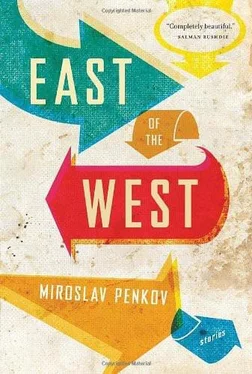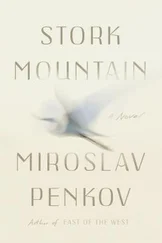In daylight, from up the road she watched a crowd surround the well. A man splashed two buckets on the pavement and all stood over the puddle as if over a deep hole. A woman began wailing. At last two militia Ladas arrived from the city, blue jars spinning. Kemal did not know if these were the people who’d taken her father — she could not tell one from the other — but she watched them scratch their heads under the blue caps and stare into the puddle like they could see the poison.
To see them so puzzled and stupid gave her a sense of lightness. She would write more notes like this one.
18.
A few drops of blood rolled down her mother’s shoulder and Kemal licked them. She watched more drops gather and wondered if her blood knew yet, if it had sensed death had come. She had moved the body back to the old room, but had nicked a spot when cutting the dress to remove it. She filled up a wooden pail with water and gathered clean gauzes from a box in the corner, and washed her mother’s arms, chest, legs. After she’d washed her, she dressed her in her other good dress. She rolled her to her father’s side of the bed and spread newspapers over where she’d just lain, to soak up the water. She brought her bagpipe but didn’t play it. Instead she lay on the newspapers, held the bag and thought of how her mother’s breath had filled it slightly. She spread out her fingers and watched them. The more she watched them, the more they looked like another girl’s. They felt borrowed, cold, swollen, and they crafted lousy bagpipes. She spoke her old name — Kemal — and the more she repeated it, the more it flowed in itself, the deeper it bit its own tail. She repeated her new name, Vyara, and kept repeating — the old name, the new name, until one devoured the other. Until both felt foreign.
Her body was not her body. Her name was not hers.
19.
Next morning, she wrapped her mother in white sheets. She dragged the bundle out in the yard and onto the two-wheeled carriage they used to haul raw skins from the pens. There were still skins in the carriage, so she spread those for a cushion. She fixed a shovel beside the body and pulled on the carriage. It wasn’t heavy.
She could see shapes behind curtains, ghosts without names and honor. By the time she reached the graveyard, the sun was as high as it would be. By the time she dug the hole up, the sun was setting. She lined the bottom with goatskins so her mother wouldn’t be too cold. She stained the sheets when she rolled her over; her hands had blistered from digging.
It was in that boy’s grave that Kemal lay her. But she would not let the boy rest beside her. So later, after she’d piled back the earth in a black heap, Kemal chucked his bones at the sun to feed its burning a little longer.
20.
That night, Kemal sheared her hair with the kitchen knife. Then, in the workshop, she gathered up all bagpipes — eighty-seven, she counted — and began to inflate them. One after the other the bagpipes let out their pointless screeching. Then, one after the other, Kemal set the woodpiles, boxes, skins, on fire. Out in the yard, she held her own bagpipe and squeezed her elbow, and let the pipe draw flat lines of sound, terrible, stabbing. She watched the flames fatten, and sparks exploding, the hut collapsing and hissing pipes and chanters shooting up in ashen showers.
All over the village dogs were barking. Once more Kemal could see shadows from dim-lit windows, and once more no one stepped out, not even to curse at her for all the clamor.
She stuffed her sweater with gauze and old newspapers, then crawled out of the village toward the cooperative haylofts. The guards were already drunk in their barrack, and even when Kemal nailed her new note on their door, they did not wake up.
Dear Party, give back my parents .
Two tractors stood in the dark, and Kemal remembered what her father had once told her: a day would come when from the east a white ram would rush, sprinting, and from the west a black ram. Both enormous, with horns like nesting snakes, like serpents of bone scattering lightning and fire. The earth would tremble with their hoofs and young and old would gather to see them. Some would hop on the white ram and up it would take them, up to the Jannah, so they could glide with the eagles. But others, vile and wretched, would crawl onto the black ram. Down the black ram would drag them, down to the low earth, to creep with the maggots.
Kemal crouched by the black ram and pressed her face against its bumper. She stuffed its mouth with gauze and paper. Lit a match, let the flame loom from under her fingers. Hid far away by the hayloft and waited for something to happen. For some time nothing happened.
Then, in pyre and lightning, the horns uncoiled and heavy hoofs made the earth tremble. She saw the black ram collide with the white ram and the guards stumble drunk and dreamy out of their barrack. Which ram would take them, she wondered, and which would take her?
I.
It’s Friday afternoon and John Martin is driving me to my wife’s. We’re picking up my daughter for the weekend and I don’t want us to be late again. I’m tired of my wife rolling her eyes, arms crossed over that heavenly chest, and tapping her foot in some maddening rhythm only she can hear. I’m tired of making her new husband look good in comparison.
I crane my neck to see how fast we’re going and tell John Martin to step on the gas.
“You want speed?” John Martin says, “Get your own damn car,” and cranks the heat higher. It’s a hundred and five outside, and John’s truck, the same one he bought after he came back from Vietnam, has trouble staying cool. Sometimes, when he drives me to Wal-Mart, he pulls over to the shoulder, pops the hood up and like shipwreck survivors on a raft with a flat sail we wait for wind to cool down the engine. But there is no time for wind now.
“How does this help, exactly?” I say, and hold my hand against the stream of hot air.
“It’s specific science,” John Martin says. “You won’t understand it.” His eyebrow twitches on an otherwise calm face, and I take this as my cue to keep pushing. “Some shortcut this is, John.”
Out the rolled down window I can see a thin strip of scorched Texas earth and yellow grass. The rest is sky, so large and dull I get angry just watching it. I look at my wrist, an old habit from the days when I still owned a watch, then I look at John Martin’s wrist. That’s where my watch is now: an original Seiko I bought, once upon a time as a student of English philology in Sofia, from an Algerian fellow for a demijohn of Father’s rakia and a pallet of Mother’s canned tomatoes. I sold the watch to John Martin and with the money took Elli to Six Flags; a great experience, if it hadn’t been for all the hitchhiking. When we returned to the house, John Martin had thrown my bed out in the front yard and piled all my clothes on top. He’d left a spiteful note on the pile, in case the message wasn’t clear enough. Pay rent, Commie . So I sent Elli in to melt his heart with some sweet talk about how much all that bonding time in line for the Judge Roy Scream ride at the Goodtimes Square had meant to her. Later she told me John Martin wept while she talked, that’s how touched he was.
Now I tilt my head to see the time better. As expected, we are already ten minutes late.
“God damn it, John. This car is absolute rubbish.”
Like that, John Martin slams on the brakes. We slide along the gravel, and when we finally come to a halt, the dust we’ve roused catches up in a thick cloud. I try to roll up my window, but that’s no good. I’m dust-slapped already, I can feel it on my face and hair and on my shirt.
Читать дальше











